Directory of North American nightclubs |
||

CALIFORNIA |

ILLINOIS |
|

MICHIGAN |

NEW JERSEY |

NEW YORK |
North America / USA
After 11 years of trajectory, Rumberos del Callejón return with their third record label “Celebrando” for Salseros lovers from all continents. An album that since its inception has gained great acceptance by the public knowledgeable of this Tropical genre.


“Celebrando” will feature several unpublished tracks that highlight the evolution of this orchestra created in Caracas – Venezuela in 2007. These singles will be interpreted mostly by guest artists of the current movement, internationally recognized for their extensive and successful musical career.

Celebrando will have a modern and emblematic sound effect, since it has the outstanding voices of: Tito Nieves, Maelo Ruiz, Gilberto Santa Rosa, Domingo Quiñonez, Sixto Yorente “El Indio”, Luis Fernando Borjas, Wilmer Lozano and with the already prestigious vocal harmonies, members of this musical group: Rodrigo Mendoza, Gonzalo Díaz, Angelito Vallenilla, Memo Arroyave and their new musical bet, the young singer, Veruzka Verdú.

This group that owes its name to the San Pedro alley located in the popular Catia area, west of the Venezuelan Capital managed to obtain the collaboration of these international guest artists on their album not only thanks to the current avant-garde technology, but also to the printed constancy and always present in the director Carlitos Padrón, who took up the challenge with his father Carlos Padrón (founder of the orchestra) to produce “Celebrando”, which also had the privileged pens in the composition of the songs by Rodrigo Mendoza and Angelito Vallenilla.

“ For me Salsa is a way of life. It’s passion and culture. Carlitos Padrón “
This album with almost 4 years of production was recorded in the main cities of the American continent: Caracas, Santo Domingo, Cuba, Miami, Orlando and mainly in the recording studio “Chongo Records” belonging to the director, founder, composer and percussionist of the band, Carlitos Padrón, in New York.
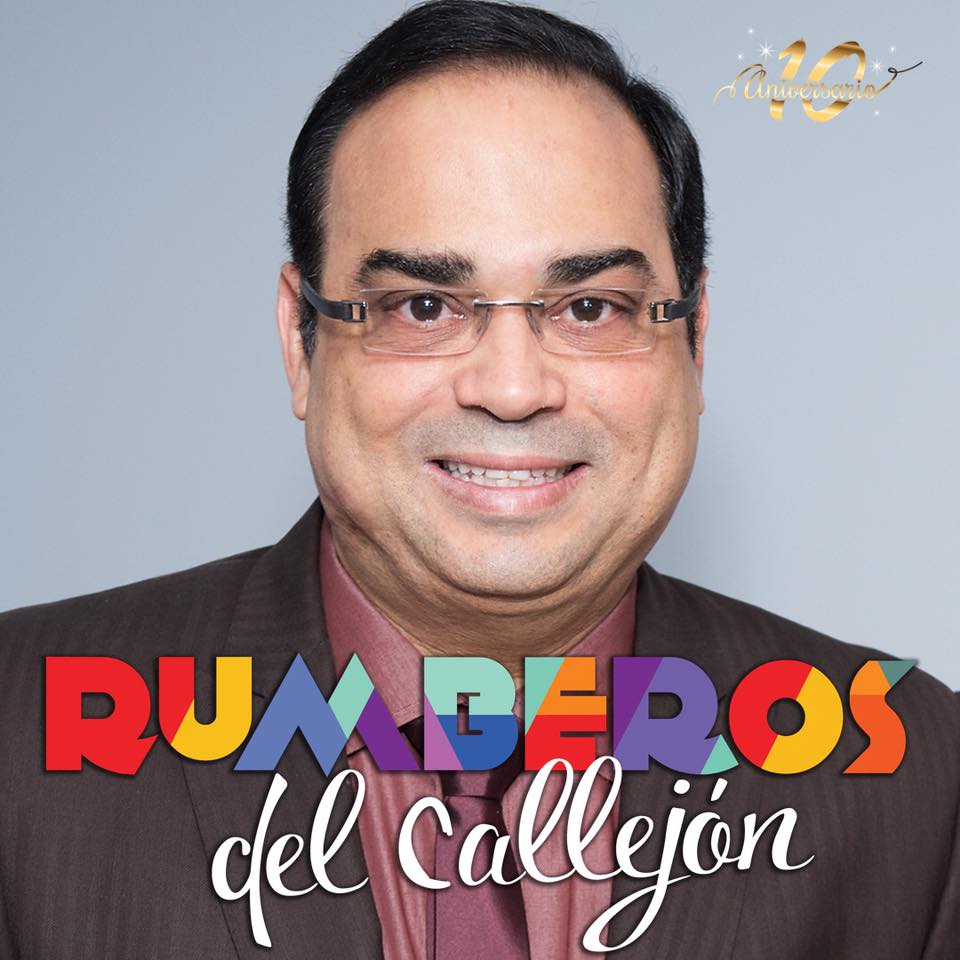
“Celebrando” has the participation of important Venezuelan arrangers of the tropical genre, such as: Alberto Crespo and Willie Melo, who along with Carlitos Padrón took care of all the sound material of the production to get to the music market with a lot of “modernism and melao”, commented Carlitos Padrón. Currently, Celebrando is in the final phase of remastering and mixing so that dancers from the 5 continents are able to enjoy this new record proposal that Rumberos del Callejón will offer them soon.
“… We have international guests of great trajectory, which are a bit difficult to get but with the Grace of God, today, I think we have an Artwork”. Carlitos Padrón
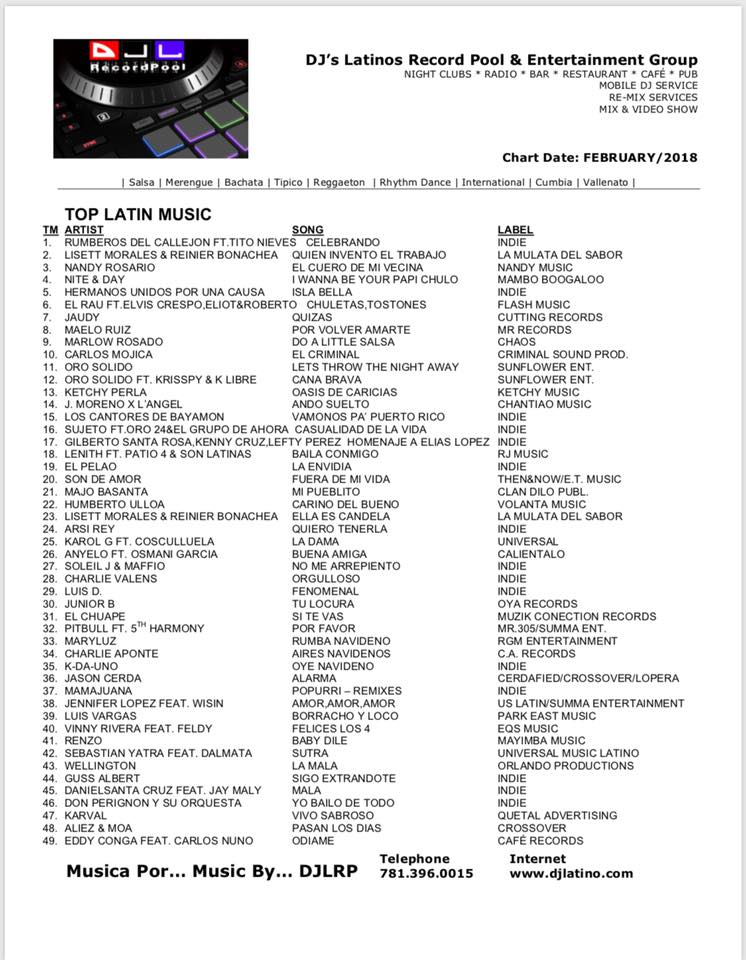
Recently, “Celebrando” whose name also titles the album, was the first single released by the group in November 2017 on all digital platforms and radio stations worldwide, and which last February managed to reach # 1 on the DJs chart.
The theme “Celebrando” has the participation of the Salsero Puerto Rican singer, Tito Nieves and the composition of the Venezuelan Angelito Vallenilla. The musical performance was in charge of the excellent Latin American musicians:
José Tabares (bass), Carlitos Padrón (Timbal), Alberto Crespo (piano), Marc Quiñones (conga), Bobby Allende (bongó), Manuel Maneco Ruiz (trumpets), Pablo Santaella (trombone), José Antonio Fariñas Gutiérrez (baritone), and in the choir: Rodrigo Mendoza, Leo Gruber, Wilmer Lozano and Angelito Vallenilla.
With this third record production product of the celebration of their 10th Anniversary, Rumberos del Callejón, hope to take their music to every corner on the planet and continue betting on the support and integration of new generations in salsa music.
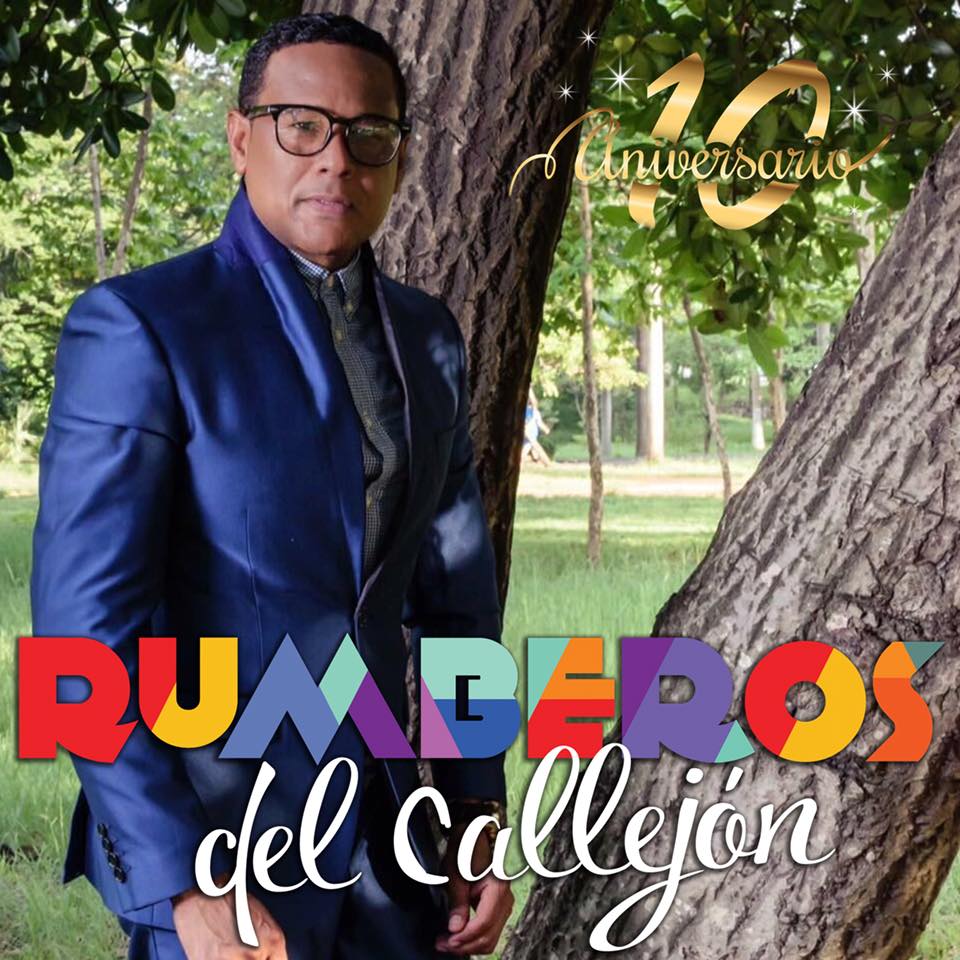
“For me, the biggest success is to be able to say that I have in my production the biggest salsa singers of today, nationally and internationally.” Carlitos Padrón
Rumberos del Callejón’s Discography:
In order to rescue the golden age of Salsa in the 70s, 80s and 90s, the Orchestra Rumberos del Callejón was created with a total of 13 members at the beginning, currently, they are 12 members. Their great musical proposal was captured in their first record production titled “De la Nada” (2008) under the label Callejón Música. This album is composed of 11 songs, including: Aquí Se Puede, Pa ‘Lante Otra Vez, Chechere Guma by Justi Barreto, among many others.

After 4 years, they release their second album “Construyendo” (2012) with such emblematic songs as “Cuando te toque llorar” by Puerto Rican balladeer José Feliciano, likewise, the production of “Constuyendo” was in charge of the director, timbalero and composer, Carlitos Padrón with arrangements made by the renowned Puerto Rican producer, Ramón Sánchez.

And Finally, for the musical performance Padrón decided to gather the best musicians from the NY area: Isidro Infante (Piano), José Tabares (Bass), Pablo Santaella (Trombone), Ray Colón (Bongó), Nelsón Jaime “Gazú” (Trumpet) , Manuel Ruiz (Trumpet), Iván Renta (Saxo Baritone) and Robert Quintero (Congas).
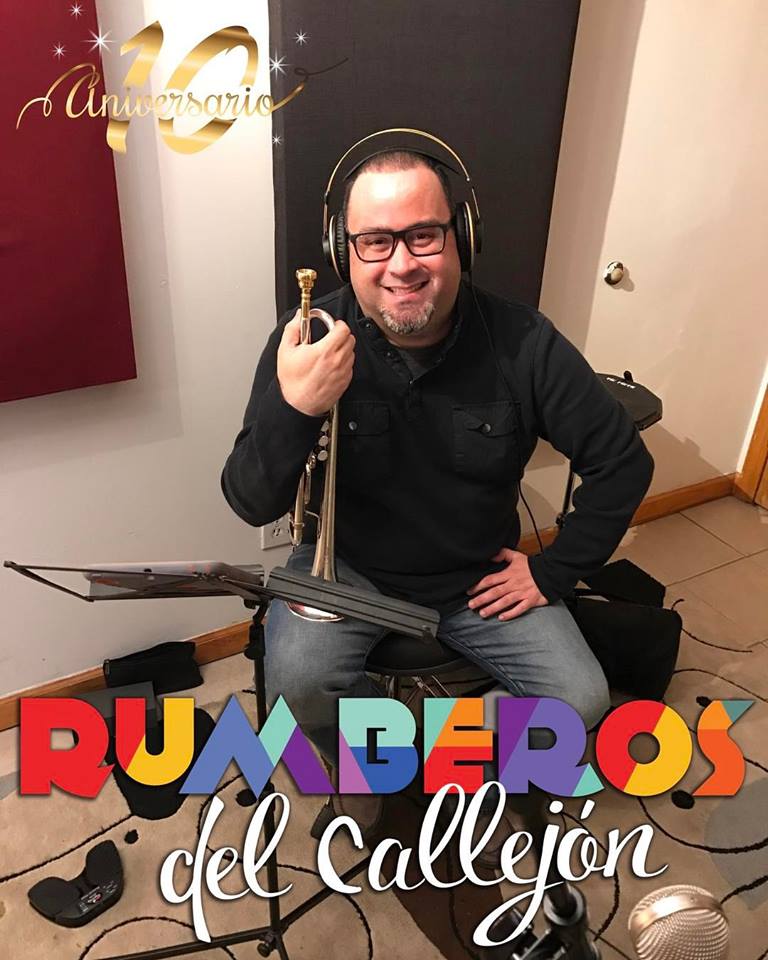
For more information, follow them at:

North America / USA / San Francisco
2018 Yerba Buena Gardens Festival (YBG Festival) proudly announces the lineup for its 18th Season.
The tradition continues to downtown in San Francisco! Hang out this new season with the first all-female mariachi ensemble, Mariachi Flor de Toloache + Mexican vocalist, composer, and guitarist Diana Gameros on Sunday, May 6 at 1:00pm, the first concert of this year’s 100 admission-free events.

The very popular series Let’s Go Salsa@Jessie also will have the best Latin artists, such as: “New Mambo Retro Salsa” group Cabanijazz Project on May 17, the nine-piece combo Bululú led by Venezuelan-born percussion master and vocalist Lali Mejia on June 21, the Bay Area’s inventive Cuban band Pellejo Seco on July 19, among many others. YGB Festival offers you entertainment FREE completely: music, theater, circus, dance, poetry & culture programs to children and entire family with artists from the Bay Area and International guests.

Named one of the Best Urban Green Spaces in North America by Local Medias, YGB Festival is a world-renowned cultural destination that offers three outdoor stages to performances for Bay Area residents, families, workers, and visitors alike. Yerba Buena Gardens Festival take place outdoors in Yerba Buena Gardens, off Mission Street between 3rd and 4th Streets, San Francisco.
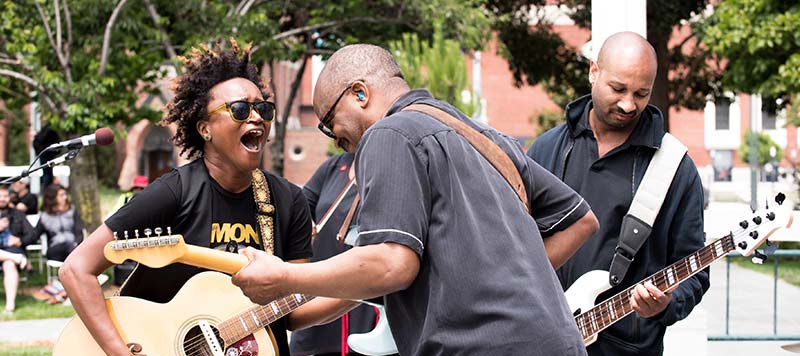
YBG Festival Executive/Artistic Director Linda Lucero says, “Get inspired! Treat yourself and treat your family, friends, and co-workers to the most diverse performing arts experience in the Bay Area. Yerba Buena Gardens Festival is Free, Outdoors, and fresh!”
During these 6 months (May – October) YBG Festival includes the highly acclaimed Let’s Go Salsa@Jessie! Dance series, the family-friendly Children’s Garden Series, Poetic Tuesdays with Litquake, and Thursday Lunchtime Concerts.
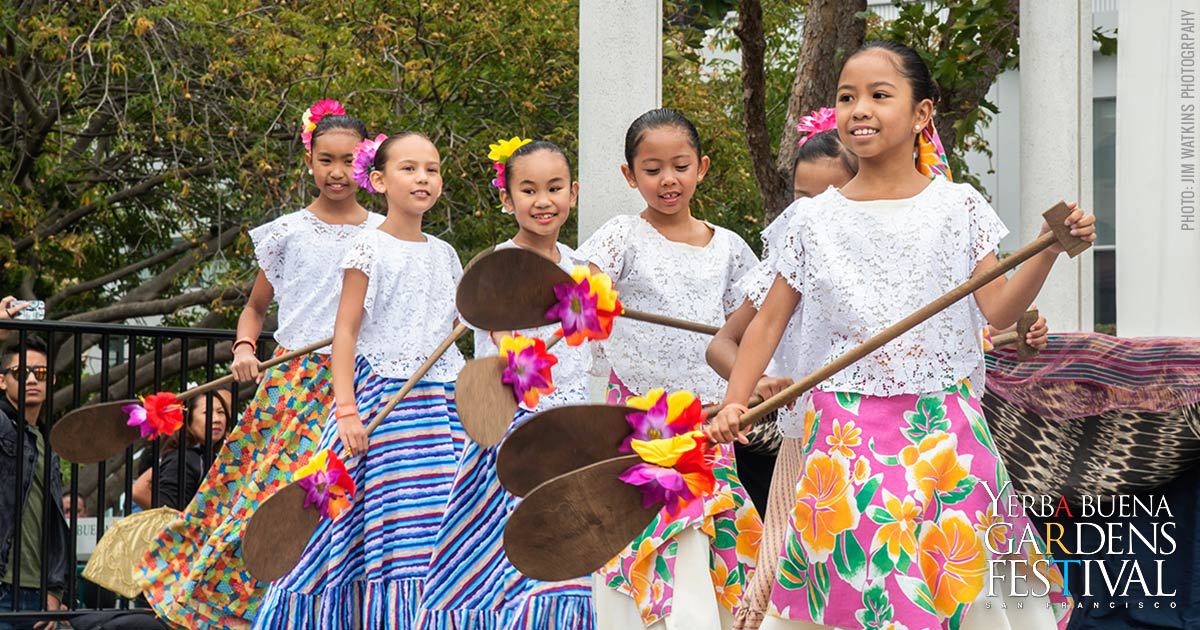
Each and every week and weekend, the Festival presents a curated lineup of musicians, dancers, poets, and artists from around the world including the Moroccan trance music of Innov Gnawa with Book of J on May 12, northwestern Indian dance with Garba in the Gardens on May 19, the 2nd Annual Yerba Buena Gardens ChoreoFest on June 2 and 3, the most celebrated gamelan ensemble outside of Bali, Gamelan Sekar Jaya.
On June 9, powerhouse Afro-Venezeulan vocalist Betsayda Machado y La Parranda El Clavo with VNote Ensemble on June 16, three performances from Festival favorites Circus Bella on June 22 and 23, the all-women klezmer group direct from New York City Isle of Klezbos with San Francisco’s Fanfare Zambaleta on July 7, Ukulenny and Cynthia Lin’s SF Uke Jam Summer Uke-Splosion!
On July 14, Cuban saxophonist Yosvany Terry Sextet on July 28, the 40th Anniversary performance of the San Francisco Lesbian/Gay Freedom Band on July 29, one of Vietnam’s most celebrated traditional artists Vân Ánh Võ & The VA’V on August 25, Manila Disco Fever on September 1, and the Yerba Buena Gardens Festival commissioned piece from Marcus Shelby Orchestra – Blackball: The Negro League and the Blues on September 8. The Festival closes with the 18th Annual Halloween Hoopla on Sunday, October 28.
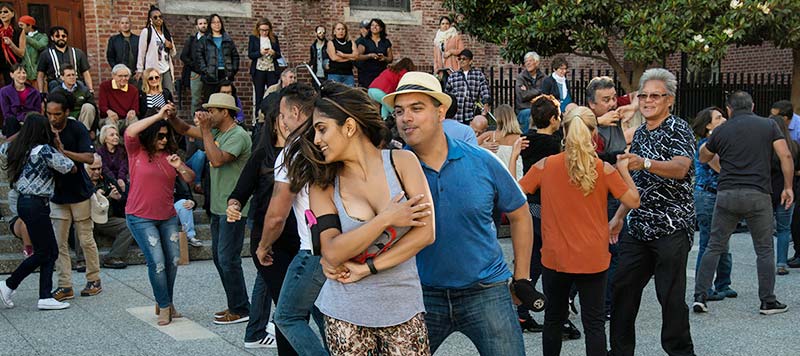
The popular series Let’s Go Salsa@Jessie!, the open-air salsa dance party in Jessie Square (near the Contemporary Jewish Museum), takes place on the third Thursday of each month from May to September from 6:00pm – 7:30pm.
Performers are the ‘New Mambo Retro Salsa’ group Cabanijazz Project on May 17, the nine-piece combo Bululú led byVenezuelan-born percussion master and vocalist Lali Mejia on June 21, the Bay Area’s inventive Cuban band Pellejo Seco on July 19, the U.S. State Department-sponsored Latin Jazz Ambassadors and the Mission’s own Annette A. Aguilar & StringBeans on August 16, and Los Mocosos vocalist and master salsero Manny Martinez y la Rebeldia on September 20.
This Festival brings the delightful Children’s Garden Series features interactive performances specially designed for kids and families every Friday from June to August in the Yerba Buena Children’s Garden at Fourth and Howard Streets.
The series presents performances by kid favorites: the 2018 Grammy-nominated Alphabet Rockers, Non Stop Bhangra,Māhealani Uchiyama, Parangal Dance Company, Circus Bella, Unique Derique, Caterpillar Puppets, Chelle! & Friends, Pi Clowns, Red Panda Acrobats, Venezuelan Music Project, Crosspulse, and Ka-Hon. The series ends with the wildly popular 18th Annual Halloween Hoopla on Sunday, October 28.
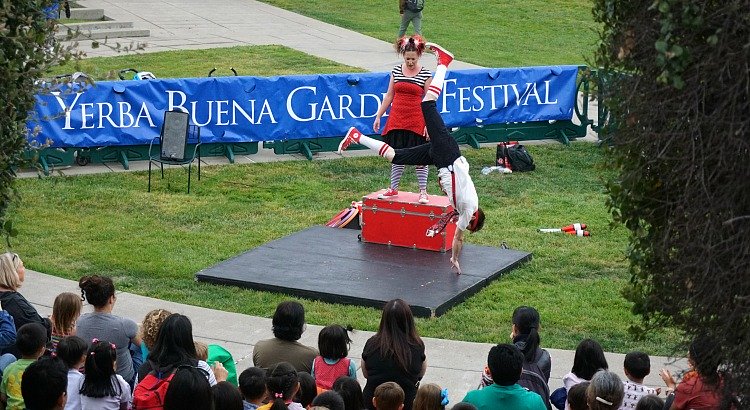
Between these 100 free performances in YBG Festival are Thursday Lunchtime Concert Series that take place most Thursdays from 12:30pm to 1:30pm and is a favorite destination of downtown workers, shoppers, tourists, and students.
This year features the very best of local and international musicians including New World String Project on May 10, Community Music Center Older Adult Choirs on May 17, Dogon Lights on May 24, Kitty Pak on May 31, Latin Jazz Youth Ensemble of San Francisco on June 7, the Swedish Consulate’s Jenny Lind Concert on June 21, Dalia & the Big Violin on June 28, Manring Kassin Burr on July 5, Maikaze Daiko on July 12, Solate on July 19, Sol Development with Mino Yanci on August 2,
LINES Dance Center on August 9, Highest Ani on August 16, Faun Fables on August 23, La Patronal on August 30, John Brothers Piano Company on September 6, Daniel Riera: Future Flutist with Electric Ensemble on October 4, and Rice Kings on October 11.

This amazing event also celebrates annually: the 21st Native Contemporary Arts Festival on June 17, the 18th Annual AfroSolo in the Gardens featuring a Tribute to Duke Ellington featuring Denise Perrier and Nina Causley with David Hardiman’s San Francisco All-Star Big Band on August 4, the 25th Annual Pistahan on August 11 and 12, and Brazil in the Gardens: Pragandaia with special guest Margareth Menezes on August 18.
Poetic Tuesdays on the second Tuesday of each month with Guest curated by Litquake, Poetic Tuesdays run from 12:30pm-1:30pm and feature an array of poets and music as well as three performances of a new one-ring circus from Circus Bella on June 22 and 23. Conceived and directed by Abigail Munn and Joel Baker for Circus Bella, the show includes static trapeze, rope walking, juggling, contortion, unicycle, original clowning, acrobatics, and more.

Let’s Go Salsa Series’ Schedule (Every Third Thursday of month from 6:00pm to 7:30pm):
Venue: 760 Howard Street, San Francisco, CA 94103.
For more information and complete 18th Season Schedule, please visit www.ybgfestival.org
Latin America / Venezuela / Caracas
This extraordinary human being died on Saturday March 24 at the age of 78. Given the shock and infinite sadness of musicians, family, friends, music teachers, his thousands of disciples and all his followers, his wake took place on Sunday, March 25, in the Simón Bolívar Hall of the National Center for Social Action for Music, and was buried in the Cementerio del Este, in Caracas, Venezuela.

The manifestations of pain, and at the same time of gratitude, that the death of the Master has produced have sounded in all corners of the world, where his person and his work have been both a source of inspiration and an object of admiration and recognition.
The teaching of ART AND MUSIC in the whole world changed radically after the creation of EL SISTEMA. We invite everyone to read here the complete report on its activity published in our magazine, in June 2015, on the occasion of its 40th Anniversary.
José Antonio Abreu economist, manager, entrepreneur, visionary, composer, conductor, distinguished teacher and tutor of several generations of Venezuelans is the founder of what is recognized as the Venezuelan musical miracle: The National System of Youth and Children’s Orchestras and Choirs from Venezuela. “This Venezuelan musician, sower of illusions and builder of dreams, has carried out a task that goes beyond the musical and cultural horizon, and is inserted in the rescue and formation of Venezuelan and Latin American youth.”

http://fundamusical.org.ve/category/el-sistema/jose-antonio-abreu/
“The life of José Antonio Abreu is the stellar journey to the land of a privileged human being, with a perfectly planned itinerary, always fulfilled and ascending. Thanks to its visionary mission, Venezuela has managed to crystallize one of the cultural, artistic and social programs of greater importance for America, the Caribbean and the world”.
Venezuela Seeded with Chefi Borzacchini Orchestras.
Caribbean Bank. Caracas, 2004.
“THERE ARE BEINGS THAT SEEM MARKED by God’s chalk. They are beings destined to leave a mark of their passage on earth. There are artists who make works of art with the purpose of conquering beauty, achieving fame or defeating death. There are others, however, rarer and more special, who prefer to dedicate themselves to making the other human being a work of art. That is the case of José Antonio Abreu: without a doubt, one of the most definitive and transcendent Venezuelans of contemporary Venezuela”.
The Impossible 3. Conversations on the edge of a microphone. Leonardo Padron.
Aguilar, Editorial Santillana. Caracas, 2008.

José Antonio Abreu was born in Valera, Trujillo state, Venezuela, on May 7, 1939, and from an early age he demonstrated his musical and artistic sensitivity. He began his music studies at the age of nine with the pianist and beloved teacher Doralisa de Medina, in the city of Barquisimeto, Lara state, once considered the musical capital of Venezuela, and then moved to Caracas in 1957.
He entered the José Ángel Lamas Superior School of Music, where he became a disciple of important Venezuelan masters such as Vicente Emilio Sojo, with whom he studied composition; Moisés Moleiro, his piano teacher, and Evencio Castellanos, who gives him organ and harpsichord classes.
In 1964 he obtained the titles of Performing Professor and Master Composer. Later he studied Orchestral Conducting with maestro Gonzalo Castellanos Yumar and became a guest conductor of the main Venezuelan orchestras.
In order to materialize his life project, the founding of El Sistema, Abreu first forged an important career as a planner and economist. I have obtained a degree in Economist from the Universidad Católica Andrés Bello, in Caracas, and a Ph.D in Petroleum Economics, from the University of Pennsylvania, USA.

His academic achievements allowed him to distinguish himself as a university professor, planner and economic advisor, serving as Director of Planning for Cordiplán, Advisor to the National Economy Council, President of the National Council of Culture, Minister of State for Culture and Deputy to the National Congress of the Republic.
In 1975 he founded the Juan José Landaeta National Youth Orchestra of Venezuela, which would later be called the Simón Bolívar Youth Symphony Orchestra of Venezuela, now the Simón Bolívar Symphony Orchestra of Venezuela, the “top” orchestra of the National System of Orchestras and Choirs . Juveniles e Infantiles de Venezuela, an enormous network planted throughout the Venezuelan territory, within which several generations of Venezuelan musicians have been formed.
Between 1960 and 1980, Abreu managed time between management, teaching and organization of the nascent cultural company that is El Sistema de Orquestas y Coros, for musical creation and a large artistic agenda that allowed him to raise his baton in front of the Orchestra Venezuela Symphony as guest conductor and, later, in front of the Youth Symphony of Venezuela and the Simón Bolívar Youth Symphony of Venezuela.

Abreu wrote some musical works, including La symphonic cantata Veni Mulier de Samaria (National Composition Prize, 1966); Oratorio on texts of the Apocalypse, Triptych for eleven instruments and Wind Quintet. He took on the challenge of conducting with his rigorous, demanding style and, above all, always searching for the depths, subtleties and meaning of the works he conducted. In this facet he has also been a teacher and has left his mark on the musical stamp and the unique sound that the Simón Bolívar Symphony of Venezuela possesses, as well as on other orchestras of the System that have been directed by him, such as the Teresa Carreño Youth Symphony. or the Caracas Youth Symphony.
Abreu has been the tutor and the most influential teacher in the style and apprenticeship of Gustavo Dudamel, Diego Matheuz, Christian Vásquez, Dietrich Paredes, as well as other young conductors who are currently taking their first steps in conducting.
“This beautiful distinction allows me to redouble my efforts to build an increasingly better world through the sowing of music in the souls of children and young people.” With these words, maestro José Antonio Abreu received on October 10, 2013, in the city of Tokyo, Japan, the Special Culture of Peace Prize awarded by the Goi Foundation for Peace, an institution that praised the creator of the National System of Orchestras and Youth and Children’s Choirs of Venezuela “for having dedicated his life to social work to promote the culture of peace through music.”

“With four decades of experience, Abreu’s work is the most important social responsibility program in Venezuela and is inspiring many nations around the world. For his invaluable musical contribution, and for having filled thousands of Venezuelan and Latin American children and young people with hope, nationalist consciousness and tools for work, this exemplary Venezuelan has received multiple national and international awards, granted by numerous governments, countries, foundations and non-governmental organizations”, among which the following stand out:
2014:
2013:
2012:
2011:
2010:
2009:
2008:
– WQXR Gramophone Award. England, 2007; Don Juan de Borbón Award for Music, 2007; GlobArt Award, 2006; International Peace Prize for Arts and Culture, 2004; UNICEF Award. Italian Committee for UNICEF, 2006. Praemium Imperiale. Japan Arts Association, 2006. International Peace Prize for Art and Culture. World Culture Open, 2004; The Right Livelihood Award. Sweden, 2001, among others. As well as countless Honorary Doctorates from Venezuelan Universities and from around the world, Orders of Merit, Gold Medals.

We invite you to review the complete list of awards received by Maestro Abreu and El Sistema on the FundaMusical website:
http://fundamusical.org.ve/category/el-sistema/recognitions/
THE SYSTEM —The National System of Youth and Children’s Orchestras and Choirs of Venezuela—

“The Orchestra System is the ideal dimension of Venezuela. From the beginning I saw in the orchestras the most beautiful expression of national unity. I saw a thriving Venezuela, full of wills and efforts to get what is wanted.”
“The irradiation of the Orchestras in the community, in each town, in each state, in the family, is undoubtedly transforming Venezuelan society. And the important thing about this is that if the other arts did the same, undoubtedly, art constitutes a fundamental, strategic, unique and revolutionary instrument for the transformation of the country”.
Jose Antonio Abreu Venezuela Seeded with Orchestras. Chef Borzacchini. Caribbean Bank, 2004.
“Thanks to El Sistema, young people from all over the world can benefit from the power of music to bring about a change in their lives. But At its deepest, El Sistema is a social program that It has saved lives and will continue to save many more.”
Sir Simon Rattle. Music Director of the Berlin Philharmonic

“The fundamental mission of El Sistema is not only to help children, but often – and literally – to rescue them and, in the process, also to produce real and lasting changes in the lives of their families and communities.
“The orchestra and the choir are much more than spaces for artistic development,” says Abreu. They are examples and schools of social life. From the very minute a child is trained to play an instrument, that child stop being poor. Becomes an agent of progress who will become a citizen” »
Changing Lives: Gustavo Dudamel, The System and the transformative power of music.
Tricia Tunstall. Editorial Alfa, Caracas 2014.
The National System of Youth and Children’s Orchestras and Choirs of Venezuela, also known as El Sistema, was conceived and founded in 1975 by maestro José Antonio Abreu to systematize the instruction and collective and individual practice of music through symphony orchestras and choirs. , as instruments of social organization and humanistic development.

This pedagogical, artistic and social model, which has reached relevance throughout the world, constitutes the social responsibility program with the greatest impact in the history of Venezuela. Its governing body is the Simón Bolívar Musical Foundation, attached to the Ministry of People’s Power of the Office of the Presidency and Monitoring of Government Management of the Bolivarian Republic of Venezuela.
The System is based on the formation, at an early age, of integral individuals for society through the individual and collective practice of music. It incorporates boys, girls and young people from all social classes:
66% come from homes with limited economic resources, or who live in adverse conditions and in vulnerable areas; while the other 34% attended belong to urban areas with better access possibilities, thus achieving an example of inclusion of all sectors and strata of the Venezuelan population, without distinctions of any kind. In this way, the orchestras and choirs radiate their healing and uplifting effects on each student, their family and their community.
The focus of this artistic-social project stands out for the collective musical practice from an early age where the premise is to make quality music through orchestral, choral, chamber, folk, alternative and diverse genre groups that constitute and are part of a community and the Nuclei, educational, artistic and administrative backbone of El Sistema throughout the national territory.
In front of the lectern and under the leadership of the director, music becomes a powerful agent of positive change; Students learn to work as a team and to achieve goals by overcoming program levels, performing a sequential symphonic and choral repertoire, and performing on national and international stages.

The methodology also includes individual classes of symphonic instruments up to general rehearsals, with a sequential repertoire gradually structured for each level that includes works of all genres -national and universal-. In this way, the development of an artistic career is promoted individually and in groups, with the support of teachers prepared to facilitate meaningful learning.
The teaching-learning process is complemented through the daily and continuous practice of the members of El Sistema, combining their activities in the nuclei with frequent presentations to the public to make their work and achievements a constant and significant learning.
The functional, educational, artistic, and administrative structure that shapes El Sistema is at its core. All the orchestral and choral programs of the Simón Bolívar Musical Foundation are held there, which makes them teaching centers that, in many cases, function as centers for promoting the educational, artistic and cultural activities of the communities. The nuclei vary in size and complexity and are located in every state in the country.

The nuclei offer musical development programs for children between 2 and 6 years of age, ranging from musical stimulation and initiation to the formation of a group that includes content and musical activities appropriate to their ages. From the age of 6, students have the opportunity to develop in pre-infant, children’s and youth orchestras, the latter for young people between 12 and 18 years of age.
It is a structure that joins this network to reach the most remote towns in the country, border areas, communities, urbanizations and schools, with the purpose that no Venezuelan girl, boy or young person is excluded from the experience and enjoyment that music provides.
In addition to developing in the musical field, the teaching-learning process facilitates the comprehensive development of the beneficiary from birth to adulthood, promoting responsibility, discipline, commitment, teamwork, respect, coexistence, collaboration and a sense of belonging, thus forming multiplier citizens of all these values in their family environments and communities.
In the teaching-learning process of El Sistema, a constant link is maintained with the community and the family environment of children and young people, in order to provide a motivating environment for the beneficiaries that allows them to continue in their educational artistic process. Parents, representatives and community thus become indirect beneficiaries.
Currently, El Sistema has 423 nuclei and 1,340 modules serving 700,000 girls, boys, adolescents and young people. The academic staff is made up of 9,010 teachers, distributed in the 24 states of Venezuela, forming a complex and systematic national network of youth and children’s orchestras and choirs: 1,305 youth, children’s and pre-children’s orchestras; 1,121 children’s and youth choirs.
It stimulates the training of children and young people in choral education, fostering the creation of networks that generate training systems for choral directors, lyrical singing students and vocal groups. Those who stand out at all levels of training make up the Youth Symphonic Choir, while the National Youth Symphony Choir of Venezuela is made up of regional teams.
It stimulates the growth of babies from the prenatal period up to 3 years of age.
The Paper Orchestra Program fosters unity between the family, the child and the teacher, designed so that the process of orchestral and choral initiation for students between the ages of 3 and 6 is pleasant and satisfying.
Alma Llanera Program, which trains children and young people through the collective practice of music with traditional Venezuelan instruments, in order to rescue and preserve popular Venezuelan folk music.

New Orchestras and Musical Genres Program that offers academic training to musicians of the popular genre and promotes the emergence of groups of all styles. Venezuelan music in all its genres and aspects (popular, folk, llanera, Afro-Venezuelan, oriental, Zulian and Caribbean music); Urban music; Jazz; Latin and Caribbean music, including the salsa genre.
Two programs stand out for their capacity for integration and social reintegration: the Special Education Program; that integrates people with disabilities through music, and the Penitentiary Symphony Orchestra Program, which seeks to minimize the levels of violence within prisons and facilitate the process of social reintegration through learning, practicing and enjoying music. music.
Hospital Care Program that provides assistance to children and adolescents who suffer from illnesses and remain in health centers.
Luteria program that trains young people in the manufacture and repair of musical instruments.

More information at:
http://fundamusical.org.ve/category/el-sistema/que-es-el-sistema/
http://fundamusical.org.ve/category/el-sistema/impacto-social/
http://fundamusical.org.ve/category/educacion/metodologia/
http://fundamusical.org.ve/nucleos/
http://fundamusical.org.ve/educacion/
Simultaneously with the pedagogical plan, which is applied throughout the national network of El Sistema, that is, in all the nuclei of the Venezuelan territory, a process of promotion is developed in practice: the student-performers enlist in the Pre-Children’s Orchestras , in the Children’s Orchestras, and, later, they moved on to the Youth Orchestras. Finally, the most talented performers, through rigorous audition processes, are selected to occupy a lectern in the Simón Bolívar Youth Symphony Orchestra of Venezuela, in its “A” or “B” section, where they achieve the greatest experience and the most high professional level.
In each of the orchestras, in their different categories, the personal and group effort of the students is promoted. For example, children and adolescents who work hard and progress have the opportunity to “win” prizes such as participating in advanced courses, workshops, seminars, rehearsals and concerts with national and international teachers.
The pedagogical plan of El Sistema contemplated, since 1980, approximately, the foundation of exemplary pedagogical structures and models as scenarios for the training and improvement of musicians.
As the demand for children entering El Sistema and its nuclei has grown, projects for the construction of new educational centers are on the rise. Among them, the Simón Bolívar Conservatory, the Montalbán Children’s Academic Center, the Center for Social Action for Music, the Academic Center for Lutherie and the twelve Latin American Academies for the instruments of: Violin, Viola, Cello, Flute, Horn, Contrabass, Clarinet, Classical Harp, Trumpet, Oboe, Bassoon and Trombone.
The Simón Bolívar Conservatory offers training of the highest pedagogical and artistic rank to the ever-increasing number of students, with a very complete curriculum of studies in which orchestral practice accounts for approximately 70%. The title of Performing Musician is granted, an important endorsement that allows graduates to continue higher studies at universities.

“…the Simón Bolívar Conservatory has emerged as the head and model of a network of conservatories already established in Yaracuy, Carabobo, Aragua, Guárico and Ciudad Bolívar. However, I am excited and pleased with the new challenge we are facing: broadening the musical and artistic horizon of that large contingent of students that El Sistema has and of those who will join in the future.
These are the new contents: the Venezuelan Popular Music Teaching Program, in all its aspects, including that of Afro-Venezuelan roots; the Urban Music Program; the Jazz Program, which is already in progress with our Simón Bolívar Big Band Jazz Symphony and the Latin and Caribbean Music Program, which especially includes the salsa genre.
This is already underway with the creation of more than 15 pilot nuclei and the formation of a body of teachers specialized in these genres. The idea is that these programs capture and channel the talent of many musicians and students who have greater virtues for these musical currents, always pursuing and achieving the same level of excellence as those who perform symphonic music in our orchestras”.
Valdemar Rodriguez. Taken from the interview with Valdemar Rodríguez, clarinetist, Director of the CSB, creator of the Latin American Clarinet Academy, among other titles and positions, by Chefi Borzhacchini in the digital book Venezuela en el Cielo de Los Escenarios. Caribbean Bank, 2010
http://www.musicabancaribe.com/Publicaciones/Libro_digital/VenezuelaEnElCielo/info/capitulo6/ii/
In the same way that teaching has been diversified, including different musical genres –popular, urban, jazz, Latin Caribbean, salsa– other orchestras have emerged dedicated to developing each of these genres, as well as festivals to promote them at the regional level. These events, organized by El Sistema, revolve around an artist, musician, composer, instrument, or arise for the meeting between musical talents from various regions, local or international.
Among them are the FIP-Llanos International Percussion Festivals, the Spain-Venezuela Festival, the Festival of New Venezuelan Clarinetists, the Chamber Music Festival (in Mérida and Caracas), the International Flute Festival, the International Bassoon Festival, the International Festival of Clarinet, International Oboe Festival, Young Virtuosos Festival, Youth Festival, Young Directors Festival and Latin American Music Festival, among others.

The Simón Bolívar Symphony Orchestra of Venezuela (OSSBV) was founded by maestro José Antonio Abreu and is currently the apex ensemble of the National System of Youth and Children’s Orchestras and Choirs of Venezuela.
Under the musical direction of maestro Gustavo Dudamel, its 180 young musicians, whose ages range between 18 and 28 years old, named Ambassadors of Peace by UNESCO, have been trained in the Orchestral Academic Program of the Simón Bolívar Musical Foundation, through the which have received master classes with outstanding world-class teachers and soloists, including teachers from the Berlin Philharmonic, the Sibelius Academy in Finland, the Bach Academy in Stuttgart and the New England Conservatory in Boston.
His performances with internationally renowned conductors include Simon Rattle, Claudio Abbado, Daniel Baremboim, Krzysztof Penderecki, Essa Pekka-Salonen, and Lorin Maazel, among many others.
Other orchestras
Bands
Assemblies
Chamber Groups
Choirs
More information at:
http://fundamusical.org.ve/agrupaciones/
The philosophy and methodology of El Sistema has had an almost magical ability to inspire artists, educators, and social activists across the globe, as Tricia Tunstall puts it in her book Changing Lives…“its guiding principles—the orchestra as school of civility and the passage from a vision centered on music to a humanistic vision of social change through music–” have been taken as a model to follow and El Sistema has been implemented or adapted in more than 66 countries in which five continents.
Programs inspired by El Sistema have emerged in:

You can find more information at:
http://www.elsistemausa.org/el-sistema-around-the-world.htm
http://fundamusical.org.ve/category/el-sistema/el-sistema-en-el-mundo/
From this space, every day we are much more aware of the unusual wealth of Latin talent that makes up the New York’s music scene, which continues to show many artists and orchestras that do not surrender to high competition and give their best to earn their place and stand out from the rest.
This is the case of Ray Rodríguez & Swing Sabroso, whose current leader, Eddie Muñiz, gives us a broader picture of the way any artist should go to keep his name alive in public taste and avoid getting lost in the large artistic catalog where there is a lot of content to choose from.

Eddie, who was born in Brooklyn, USA, but communicates in excellent Spanish, had his first approaches to music in elementary school at the age of 13, when he played in several classical music and jazz groups to keep improving in these arts and find his style until he had his big break.
This opportunity came when the young man turned 17 years old, at which point he had his professional career in music with a group of friends, with whom he stayed for two or three years. After that, his next group was called ”Herencia Latina” whose director was the talented Ray Rodriguez and would become the starting point of his current orchestra Swing Sabroso.
After leaving Herencia Latina, he joined Ismael’s conjunto for four years and subsequently played with Conjunto Clasico, Ray de La Paz, La Sonora Matancera, Tony Vega and many more.
About eight years later, the group did not go ahead and Ray moved to New Jersey, but as it happens, Eddie had to do the same for work reasons. Back then, Ray started a group he called Ray Rodriguez y Swing Sabroso, which invited Eddie to join the orchestra in 2000. 24 years later, it is he himself who moved such an ambitious project forward after Ray’s sad loss from the cancer on April 17, 2016.

By the time Ray was in good health, the orchestra released two albums, one in 2005 and another in 2015. When the bandleader began to sicken, he knew he could not give the group the attention it required, so he asked Eddie to take the helm of the ship in his place as long as the group was only called Swing Sabroso, nothing else.
At that time, the group only had two trumpets and a trombone, but Eddie was gradually enlarging it and adding more instruments to make the sound fuller. Being in total control of the orchestra, the artist released the album ”Swing Sabroso, Mejor Que Nunca” in the year 2022, when they played everything that the three albums included.

Currently, Eddie is the oldest of all the Swing Sabrso members, but not for that things are always done his way. In fact, the artist assures that the younger musicians are frequently those who teach him what to do in certain cases.
Far more than a salsa orchestra, Eddie considers that ”Swing Sabroso” is also a family of musicians in which they support each other, despite the regrettable absence of its main founder, the great Ray Rodriguez. Even so many years later, Rodriguez remains the biggest influence on everyone working with Swing Sabroso.
Read also: Dominican trumpeter Wilson Portuondo talks about La Sonora Nuyorkina